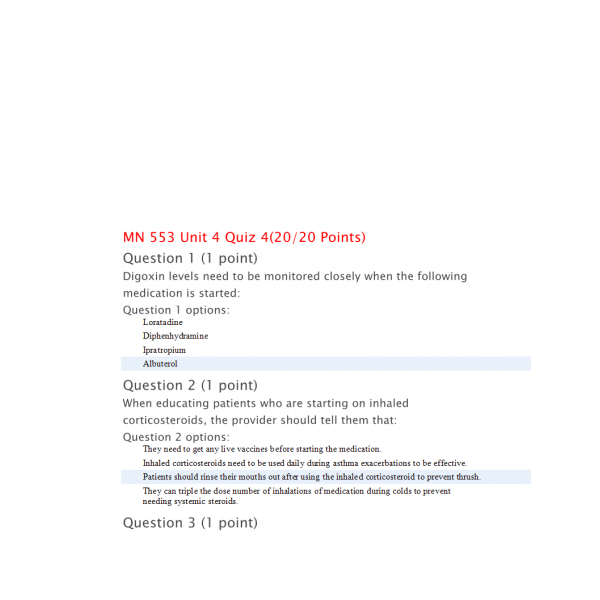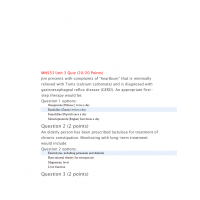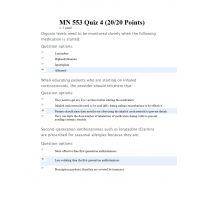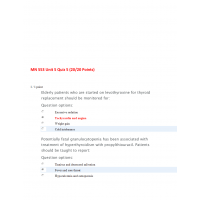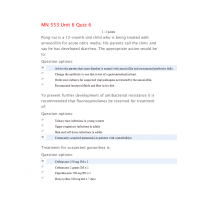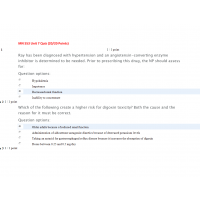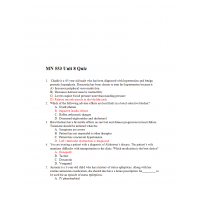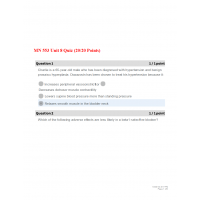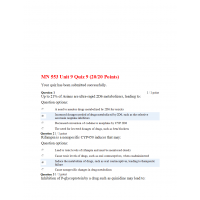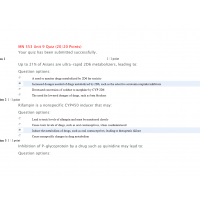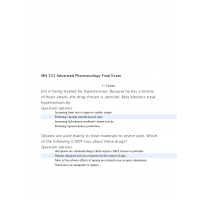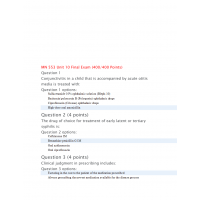MN 553 Unit 4 Quiz
1. Digoxin levels need to be monitored closely when the following medication is started:
2. When educating patients who are starting on inhaled corticosteroids, the provider should tell them that:
3. Second-generation antihistamines such as loratadine (Claritin) are prescribed for seasonal allergies because they are:
4. Henry presents to clinic with a significantly swollen, painful great toe and is diagnosed with gout. Of the following, which would be the best treatment for Henry?
5. Patients whose total dose of prednisone will exceed 1 gram will most likely need a second prescription for:
6. Patients prescribed aspirin therapy require education regarding the signs of aspirin toxicity. An early sign of aspirin toxicity is:
7. Prior to developing a plan for the treatment of asthma, the patient’s asthma should be classified according to the NHLBI Expert Panel 3 guidelines. In adults mild-persistent asthma is classified as asthma symptoms that occur:
8. Patients with a COPD exacerbation may require:
9. Asthma exacerbations at home are managed by the patient by:
10. The most common bacterial pathogen in community-acquired pneumonia is:
11. The first-line antibiotic choice for a patient with comorbidities or who is immunosuppressed who has pneumonia and can be treated as an outpatient would be:
12. Wing-Sing is a 4-year-old patient who has suspected bacterial pneumonia. He has a temperature of 102°F, oxygen saturation level of 95%, and is taking fluids adequately. What would be appropriate initial treatment for his pneumonia?
13. Instructions for a patient who is starting nicotine replacement therapy include:
14. If prescribing bupropion (Zyban) for tobacco cessation, the instructions to the patient include:
15. The most appropriate smoking cessation prescription for pregnant women is:
16. Drug resistant tuberculosis (TB) is defined as TB that is resistant to:
17. Kaleb has extensively resistant tuberculosis (TB). Treatment for extensively resistant TB would include:
18. Ezekiel is a 9-year-old patient who lives in a household with a family member newly diagnosed with tuberculosis (TB). To prevent Ezekiel from developing TB he should be treated with:
19. Myles is a 2-year-old patient who has been diagnosed with acute otitis media. He is afebrile and has not been treated with antibiotics recently. First-line treatment for his otitis media would include:
20. Jacob has been diagnosed with sinusitis. He is the parent of a child in daycare. Treatment for sinusitis in an adult who has a child in daycare is:
| Institution & Term/Date | |
| Term/Date | Kaplan University |
MN 553 Unit 4 Quiz 4 (Set 2)
- Product Code: 2022
- Availability: In Stock
-
$14.99
Related Products
MN 553 Unit 3 Quiz 3
$9.99
MN 553 Unit 4 Quiz 4
$14.99
MN 553 Unit 5 Quiz 5
$14.99
MN 553 Unit 6 Quiz 6
$9.99
MN 553 Unit 7 Quiz 7
$14.99
MN 553 Unit 8 Quiz 1
$14.99
MN 553 Unit 8 Quiz 2
$14.99
MN 553 Unit 9 Quiz 9 (Set 1)
$14.99
MN 553 Unit 9 Quiz 9 (Set 2)
$14.99
MN 553 Unit 10 Final Exam
$29.99

